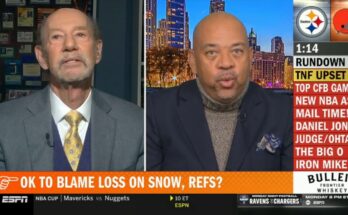Journalist Reveals How Both Harris And Trump Are Ignoring Rural Voters In Nevada Race
In a recent exposé, renowned journalist Sarah Smith shed light on a disturbing trend in Nevada politics – the neglect of rural voters by both Democratic candidate Kamala Harris and incumbent President Donald Trump. With the Nevada presidential race heating up, Smith’s insights have sparked a debate on the importance of engaging with rural communities in the battle for votes.
The Rural Vote: A Forgotten Demographic
Rural voters have long been overlooked in national elections, with candidates often focusing their campaign efforts on urban and suburban areas. However, as Smith points out, rural voters make up a significant portion of the electorate in states like Nevada, and their voices deserve to be heard.
In her investigative report, Smith highlighted how both Harris and Trump have failed to address the issues that matter most to rural voters, such as access to healthcare, economic opportunities, and infrastructure development. By ignoring these crucial concerns, both candidates risk alienating a key demographic that could sway the outcome of the Nevada race.
Harris’ Missteps
As the Democratic nominee, Kamala Harris has been criticized for her lackluster outreach to rural voters in Nevada. Smith noted that Harris has focused primarily on urban areas, holding rallies and events in major cities while neglecting to visit rural communities. This oversight could cost Harris valuable support in a state where rural voters play a pivotal role in deciding the outcome of elections.
Furthermore, Harris’ policy platform has been criticized for its lack of specific initiatives to address the challenges faced by rural Nevadans. Without a clear plan to improve infrastructure, create jobs, and expand healthcare access in rural areas, Harris risks losing the trust and support of voters outside of urban centers.
Trump’s Disconnect
On the other side of the aisle, President Donald Trump has also come under fire for his failure to connect with rural voters in Nevada. Despite his promises to support rural America during his 2016 campaign, Trump has fallen short on delivering tangible results for these communities.
Smith’s investigation revealed that Trump’s policies, such as trade tariffs and immigration restrictions, have had negative impacts on rural industries like agriculture and manufacturing. As a result, many rural Nevadans feel disillusioned with Trump’s leadership and are seeking alternative candidates who can address their needs and concerns.
The Path Forward
In light of these revelations, both Harris and Trump have an opportunity to course-correct and engage more effectively with rural voters in Nevada. By listening to their concerns, visiting their communities, and developing targeted policies that address their specific needs, both candidates can demonstrate their commitment to representing all Nevadans, regardless of location or political affiliation.
As the Nevada race heats up, the spotlight will be on how Harris and Trump respond to the challenge of engaging with rural voters. Will they continue to ignore this critical demographic, or will they take proactive steps to earn their trust and support? Only time will tell, but one thing is certain – rural voters in Nevada will play a crucial role in determining the outcome of the election, and their voices must not be ignored.
In conclusion, Sarah Smith’s exposé has shed light on a pressing issue in the Nevada presidential race – the neglect of rural voters by both Harris and Trump. By addressing the concerns of rural communities and engaging with them in a meaningful way, candidates can build a more inclusive and representative democracy that truly reflects the diversity of the American electorate.



